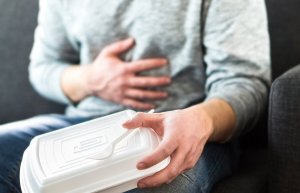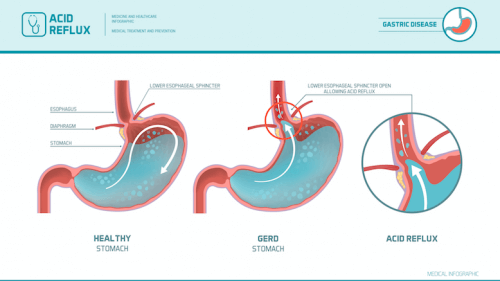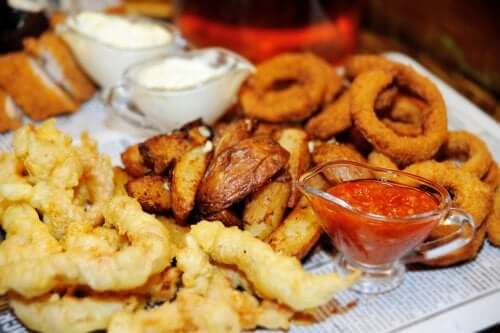How To Calm Your Gastroesophageal Reflux Symptoms

The diet you need to alleviate this condition isn’t the same as other balanced diets. To calm your gastroesophageal reflux symptoms, you need to avoid certain foods that exacerbate them.
In this article, we’ll tell you what changes you should make to feel better and avoid the main discomforts caused by gastroesophageal reflux.
What is gastroesophageal reflux?

Gastroesophageal reflux, also known as acid reflux, happens when the muscle at the end of the esophagus – the tube that transports food from the mouth to the stomach – doesn’t close properly. Because of this, your stomach acid can rise to the esophagus, irritating it.
If you suffer from this disease, you’ll probably feel acidity and burning in your throat. Feeling your stomach liquid in the back of your throat (regurgitation), having a dry cough, or problems swallowing are also symptoms of gastroesophageal reflux.
To alleviate these symptoms you can:
- Eat smaller portions at each meal.
- Avoid foods covered in sauces, and greasy or acidic foods.
- Follow a diet for gastroesophageal reflux.
- Don’t drink alcohol.
- Lose weight, in the case of being overweight.
Diet tips to calm your gastroesophageal reflux symptoms
To improve the symptoms caused by this disease, you don’t just need to follow a healthy and balanced diet, you also have to avoid irritating foods.
Here are some tips.
1. Eat a well-balanced diet.

The doctor will advise you to change your eating habits so that you eat enough fruits and vegetables every day, as well as grains and beans.
Vegetables provide you with vitamins and minerals while also being low in fat and sugar. Good options to reduce stomach acidity are asparagus, cauliflower, broccoli, potatoes, and cucumbers. Regarding fruits, doctors often recommend you avoid citric fruits that can cause acidity, as well as tomatoes. It’s better to eat bananas, apples, pears, and melons.
Among grains, oats stand out as the best. Choose whole-grain varieties and without added sugar, you won’t just get the fiber your body needs, but also you’ll see how it helps you to reduce stomach acidity. You can also go with rice and whole-grain bread.
2. Avoid coffee.
Coffee is one thing you should eliminate from your diet for gastroesophageal reflux because it’s an irritant and can increase your stomach’s acidity. In its place, you should drink teas like thyme, orange leaf, hops, or chamomile.
3. Eat 5 meals a day.
By having five meals a day, you’ll eat smaller amounts at each meal. That way, you’ll avoid overloading your stomach and you’ll minimize the chance that the food will return through it to your esophagus.
4. Avoid spicy foods.
Condiments like hot peppers, chili, vinegar, cayenne pepper, and curry irritate the stomach lining, exacerbating acidity.
5. Increase your Omega 3 and Omega 6 consumption.
Omega 3 and Omega 6 fatty acids have anti-inflammatory properties that can help reduce inflammation of your stomach lining. Take advantage of these properties by eating seafood, always avoiding fried versions, and choosing healthy options.
Don’t miss this: Five Plant Sources of Omega-3 Fatty Acids
6. Don’t eat fried food.

You should completely eliminate fried and greasy foods from your diet if you suffer from gastroesophageal reflux. Fatty foods make digestion more difficult, forcing your stomach to work harder and make more acid.
Choose a different way to cook instead: steamed, boiled, baked, microwaved, or en papillote.
7. Don’t drink much liquid with your meals.
Drink throughout the day, but not at meals (or only a small amount). That way, you’ll avoid filling your stomach to the brim and overloading it.
Remember: Water should be your main option, especially before sodas and juices, which are also irritants.
8. Choose low-fat dairy products to calm your gastroesophageal reflux symptoms.
As we already mentioned, fatty foods make digestion more difficult, which can exacerbate reflux symptoms. It’s better to eat low-fat or skimmed yogurt, milk, and cheese.
That way, you’ll be able to more easily digest your food.
9. Avoid exercising right after eating.
Exercising or doing sports after eating can cause your gastroesophageal reflux to flare up. If you play a sport, try to do it at least two hours after eating.
10. Have dinner at least two hours before going to bed.
Laying down can exacerbate symptoms of gastroesophageal reflux. Eat dinner early to give your body time to digest before you lay down. Likewise, you can sleep with tall pillows that keep your head higher than the rest of your body to reduce discomfort.
11. Don’t smoke.

Tobacco isn’t a food, but it can also act as an irritant. If you have gastroesophageal reflux symptoms and smoke, we recommend you quit smoking for your health and comfort.
12. Eat healthy fats to calm your gastroesophageal reflux symptoms
Olive, sesame, and sunflower oils, avocado, nuts, and flax seeds all provide healthy fats for your diet. Consume these foods in salads, on toast, and in all sorts of dishes.
You might be interested in: Five Healthy Fats that Help Lower Your Cholesterol
13. Say goodbye to chocolate and chewing gum
One of the ingredients of chocolate is methylxanthine, a component that helps to relax muscles and increases the chances of reflux. Chewing gum, like any candy with mint flavor, can also cause increased acidity.
14. Eat ginger
Ginger has anti-inflammatory properties that can help calm your gastroesophageal reflux symptoms. You can eat it as an ingredient in your meals, or make a ginger tea.
Always talk with your doctor about the best diet for gastroesophageal reflux according to your nutritional and calorie needs. Your doctor will guide you on the right path to alleviate your symptoms.
All cited sources were thoroughly reviewed by our team to ensure their quality, reliability, currency, and validity. The bibliography of this article was considered reliable and of academic or scientific accuracy.
- National Institute of Diabetes and Digestive and Kidney Diseases. Acid Reflux (GER & GERD) in Adults. https://www.niddk.nih.gov/health-information/digestive-diseases/acid-reflux-ger-gerd-adults
- International Foundation for Gastrointestinal Disorders. (2017). Diet Changes for GERD. https://www.aboutgerd.org/diet-lifestyle-changes/diet-changes-for-gerd.html
- Kubo, A., Block, G., Quesenberry, C. P., Buffler, P., & Corley, D. A. (2009). Effects of Dietary Fiber, Fats, and Meat Intakes on the Risk of Barrett’s Esophagus. Nutrition and Cancer, 61(5), 607–616. https://doi.org/10.1080/01635580902846585
- Mayo Clinic. Enfermedad por reflujo gastroesofágico. https://www.mayoclinic.org/es-es/diseases-conditions/gerd/symptoms-causes/syc-20361940
This text is provided for informational purposes only and does not replace consultation with a professional. If in doubt, consult your specialist.








